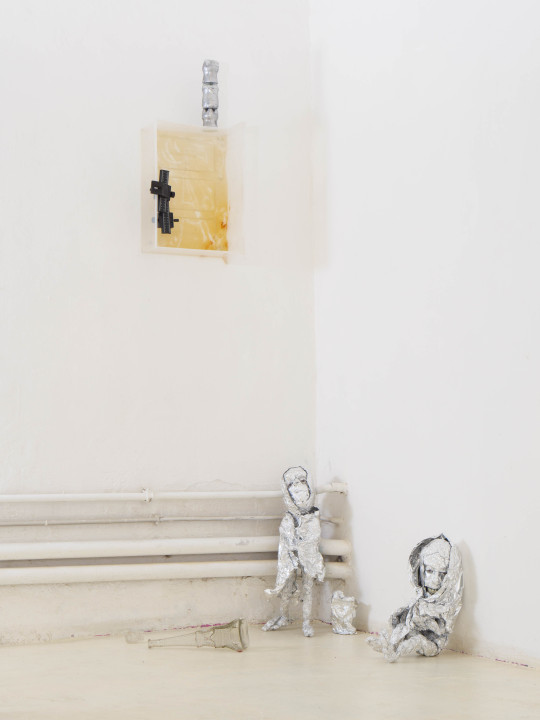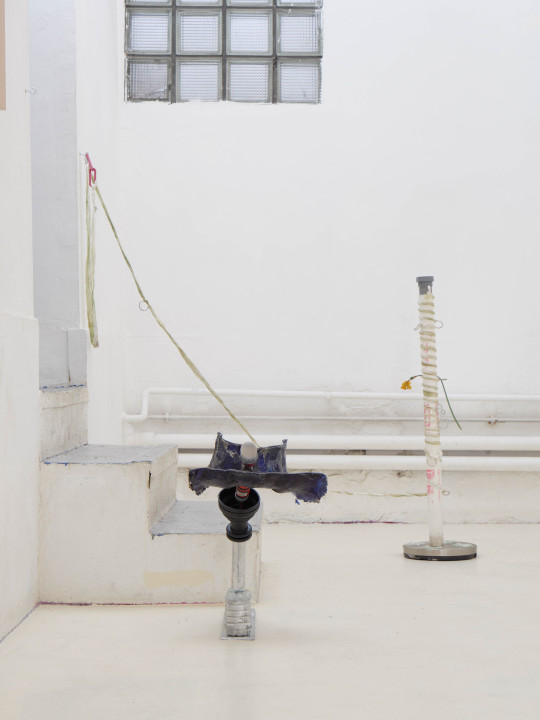#paulineperplexe
Explore tagged Tumblr posts
Photo










île-de-france
Iéna Situation #4 Marianne Dupain Morgane Le Doze Raphaël Massart Matthias Odin Mathis Perron Janna Zhiri
[FR] — scroll for english
(10) Une communauté qui aurait enfin renoncé à chercher l’étoile au-dessus de sa tête. île-de-france, c’est la critique du poids de l’administration nécessaire. La lourdeur des heures passées à attendre, les corps réunis par des espaces et des circonstances, mais sans convivialité. Placer quelque chose dans un white cube, c’est toujours reconstituer la violence de la muséification. Cela semble approprié étant donné le caractère « sacré » des objets d’art. En revanche, il faudrait se demander en l’occurrence ce qui leur fait perdre leur aspect crucial de leur sacralité — c’est-à-dire leur viabilité en tant que marchandise — pour retrouver la joie.
(11) La société de l’île est secrète au sens bataillien : c’est une totalité close, renfermée sur elle-même, opposée à la société officielle. Elle est ironique dans sa structure : négation de l’extérieur. Mais quand l’ironie romantique sépare le poème du réel, s’en autonomise pour ne s’intéresser qu’à l’esprit, à la pensée en soi, la société secrète est un autre type de négation. Elle est négation de l’intellect, informe au sens de sans forme — insubordination des faits matériels aux idées et à l’esprit. Affirmation des basses fonctions, de la vie et du plaisir contre la soumission à l’intellect et à l’éternité.
(12) On ne retourne pas en enfance, pas plus qu’on ne rentre sur l’île. L’espace où nous sommes n’apparaît pas seulement comme la reconstitution d’une île. Il est la re-distribution de l’île elle-même : l’atomisation de ses structures (terre, routes, bâtiments, hydrographie…) dans lesquelles il se ramasse et se contracte tout entier ; de manière aussi bien métonymique (il est chacun de ses fragments) que métaphorique (il est le mouvement, la dis-location qui engendre sa séparation du continent et l’émancipe de son ancrage topologique). Île errante, mouvante, incertaine. Île contrepoint désarrimée de son port, arche jetée à la mer comme un radeau ivre dont la trajectoire ne s’arrête qu’à l’étale. En l’occurrence, L’Île-de-France est le prétexte même de ce déplacement dont la restauration finale affirme qu’elle rendra les choses de cette terre à leur état d’origine et inaugurera ainsi une nouvelle sorte d’harmonie dans le chaos.
(13) Tout endroit est potentiellement une île au sens où une île est essentiellement absence. Absence de lien et hétérogénéité - altérité et séparation, altérité par la séparation. Séparation pas comme contiguïté, pas comme celle qui sépare deux états, mais comme distance. Différence non pas de quantité, mais de qualité. En ce sens, l’île est toujours une société secrète et inversement. En cela, notre île est nomade et nous pouvons l’invoquer partout. Nomade par sa mobilité, sa capacité à se reformer partout, mais aussi nomade par opposition avec la sédentarité et le mythe de la permanence et de la transcendance des institutions. Notre île n’a rien d’éternel, rien de fixe, tout y est temporel, informe, glissant.
(14) À bout de course, lorsque l’air se raréfie au profit des ondes 5G, lorsque tout le profane est déterminé par le signe de la profondeur, se présente malgré tout la possibilité d’une ultime hésitation devant certaines des implications de l’ironie. Dans cette autre île, qui en contient d’autres, encore ; nous, les îlien·ne·x·s, nous créons des archipels, mais nous ne les conservons pas. Ce que nous créons est grevé par d’autres, pour les intérêts des autres, des états et des institutions, qui se réservent le profit de réaliser les cartes que nous sommes seul·e·x·s à découvrir. Nous ne possédons pas l’île — elle nous possède.
(15) île-de-france est une escale de notre île, une Île-de-France informe et ironique. Informe comme déclassement, c’est-à-dire négation de la forme ou plutôt de l’idée d’essence ou de vérité. Ce n’est pas un double, ou une image déformée de la « vraie » Île-de-France, mais bien l’idée que l’Île-de-France n’existe pas. Elle est un point de passage de notre mythologie, de notre récit. Une fiction — c’est-à-dire faux, mais non faux par rapport au vrai, simplement faux en soi et pour soi. Autonome et séparé. Œuvre ironique parce que négation et autonomie. Mais postulat pour une fiction — un faux — qui serait moteur et liant de la communauté.
[ENG]
(10) A community that would have renounced at last to search for the star above its head. île-de-france is the critic of the weight of a necessary administration. The weight of hours spent waiting, bodies reunited by spaces and circumstances, but without warmth. To place something in a white cube, always reenacts the violence of museumification. This seems suitable considering the ‘sacred’ character of artworks. However one must ask oneself in this case what makes them lose the crucial aspect of their sacredness – that is to say their viability as merchandise – to rediscover joy.
(11) The island’s society is a secret society in the Bataillian way: it is an enclosed totality, self-contained, opposed to the official society. In its structure, it is ironic: negation of the outside. But while romanticist irony detaches the poem from the concrete reality, autonomising it to focus only on the spirit, on the thought in itself, the secret society is another type of negation. It is negation of the intellect, formless in the meaning of without shape – insubordination of the material facts to the thoughts and to the spirit. Affirmation of low functions, life and pleasure against submission to the intellect and eternity.
(12) One doesn’t go back to childhood, no more than they return to the island. The space in which we are, doesn’t only appear to be the reconstitution of an island. It is the redistribution of the island itself: the atomization of its structures (earth, roads, buildings, hydrography…) in which it wraps and contracts itself entirely; both metonymically (it is each of its own fragments) and metaphorically (it is the movement, the dis-location that triggers its separation from the continent and frees it from its topological anchorage). Wandering island, moving, uncertain. Contrapuntal island undocked from its port, arch swayed into the sea like a drunken raft that only stops its path at slack tide. As a matter of fact, The Île-de-France is the reason for this displacement whose final restoration affirms it will render the things of this earth their original state and inaugurate a new kind of harmony from within the chaos.
(13) Every place is potentially an island. Meaning that island is essentially absence. Absence of connection and heterogeneity – otherness and separation, otherness through separation. Separation not as contiguity, not as that which separates two states, but as distance. Difference not of quantity but of quality. In this sense, the island is always a secret society and vice versa. In this way, our island is nomadic and we can invoke it everywhere. Nomadic by its mobility, its capacity to be formed everywhere, but also nomadic in opposition to sedentariness and the illusion of permanence and transcendence of the institutions. Our island has nothing eternal, nothing fixed, everything is temporal, formless, slippery.
(14) On your last legs, when the air becomes scarce for the benefit of 5G cell waves, when all the profane is determined by the sign of depth, the possibility of an ultimate hesitation nevertheless presents itself before certain implications of irony. In this other island, that contains others, still, us, islanders, we create archipelagos, but we do not conserve them. What we create is encumbered by others, for the interest of others, states and institutions, that reserve the right to make maps we are the only one’s to discover. We do not own the island – it owns us.
(15) île-de-france is a stopover on our island, an Île-de-France that is shapeless and ironic. Formless as declassification, that is to say it’s a negation of the form or rather a negation of the concepts of essence and truth. It is not a double, or a distorted image of the ‘actual’ Île-de-France but the idea that there is no actual Île-de-France. It is a step in our mythology, in our narrative. A fiction – meaning it’s false, but not false in relation to the truth, simply false in itself and for itself. Autonomous and separate. An ironic work because negation and autonomy. But a postulate for a fiction – a false – that would be the driver and link of the community.
—
Iéna Situation: note of intent
list of artworks
photos: Raphaël Massart
—
+ bout-de-ligne: readings/performances/editions/objects by Fanal Parade.
from 18 to 25 March 2023 @ Pauline Perplexe, 90 avenue de la Convention 94110 ARCUEIL.
0 notes